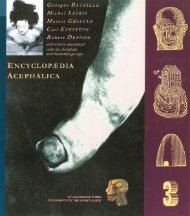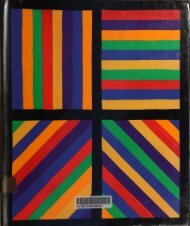SITUATIONISTS AND THE 1£CH MAY 1968
umMYFs
umMYFs
You also want an ePaper? Increase the reach of your titles
YUMPU automatically turns print PDFs into web optimized ePapers that Google loves.
packed out, the seat of continuous, passionate<br />
debate on every subject that ever preoccupied<br />
thinking humanity. No formal lecturer ever<br />
enjoyed so massive an audience, was ever lis·<br />
tened to with such rapt attention • or given such<br />
short shrift if he talked nonsense.<br />
A kind of order rapidly prevailed. By the second<br />
day a noticeboard had appeared near the<br />
front entrance announcing what was being<br />
talked about, and where. ! noted: 'Organisation<br />
of the struggle'; 'Political and trade union rights<br />
in the University'; 'University crisis or social crisis?';<br />
'Dossier of police repression'; 'Self-management';<br />
'Non-selection' (or how to open the<br />
doors of the University to everyone); 'Methods<br />
of teaching'; 'Exams', etc. Other lecture theatres<br />
were given over to the students-workers liaison<br />
committees, soon to assume great importance.<br />
In yet other halls, discussions were under way<br />
on 'sexual repression', on 'the colonial question',<br />
on 'ideology and mystification'. Any group<br />
of people wishing to discuss anything under the<br />
sun would just take over one of the lecture the·<br />
atres or smaller rooms. Fortunately there were<br />
dozens of these.<br />
The first impression was of a gigantic lid<br />
suddenly lifted, of pent-up thoughts and aspirations<br />
· suddenly exploding, on being released<br />
from the realrrf of dreams into the realm of the<br />
real and the possible. In changing their environment<br />
people themselves were changed. Those<br />
who had never dared say anything suddenly felt<br />
their thoughts to be the most important thing in<br />
the world • and said so. The shy became communicative.<br />
The helpless and isolated suddenly<br />
discovered that collective power lay in their<br />
hands. The traditionally apathetic suddenly<br />
realised the intensity of their involvement. A<br />
tremendous su rge of community and cohesion<br />
gripped those who had previously seen themselves<br />
as isolated and impotent puppets, dominated<br />
by institutions that they could neither<br />
control nor understand. People just went up and<br />
tall,ed to one another without a trace of self-con·<br />
sciousness. This state of euphoria lasted<br />
throughout the whole .fortnight I was there. An<br />
inscription scrawled on a wall sums it up perfectly:<br />
'Deja dix jours de bonheur' (ten days of<br />
happiness already).<br />
In the yard of the Sorbonne, politics<br />
(frowned on for a generation) took over with a<br />
vengeance. Literature stalls sprouted up a\eng<br />
the whole inner perimeter. Enormous. portraits<br />
appeared on the internal walls: MarX;·· Lenin,<br />
Trotsky, Mao, Castro; Guevara, a revolutionary<br />
resurrection breaking the bounds of time and<br />
place. Even Stalin put in a transient appeaince<br />
(above a Maoist stall) until it was tactfully suggested<br />
to the comrades that he wasn't really at<br />
home in such company.<br />
On the stalls themselves every kind of literature<br />
suddenly blossomed forth in the summer<br />
sunshine: leaflets and pamphlets by. anarchists,<br />
Stalinists, Maoists, Trotskyists (t hree varieties),<br />
the PSU and the non-committed. The yard of the<br />
Sorbonne had become a gigantic revolutionary<br />
drug-store, in which the most esoteric products<br />
no longer had to be kept beneath the counter<br />
but could now be prominently . displayed. Old<br />
issues of journals, yellowed by the years, were<br />
unearthed and often sold as well as more recent<br />
material. Eve rywhere there were groups of 10 or<br />
20 people, in heated discussion, people talking<br />
about the barricades, about the CRS, about their<br />
own.experiences, but also about the commune<br />
of 1871, about 1905 and 1917, about the Italian<br />
left in 1921 and about France in 1936. A fusion<br />
was taking place between the consciousness of<br />
the revolutionary minorities and the consciousness<br />
of whole new layers of people, dragged day<br />
by day into the maelstrom of political controversy.<br />
The students were learning within days what<br />
it had taken others a lifetime to learn. Many<br />
lyceens came to see what it was all about. They<br />
too got sucked into the vortex. I remember a boy<br />
of 14 explaining to an incred ulous man of 6o why<br />
students should have the right to depose professors.<br />
Other things also happened. A large piano<br />
suddenly appeared in the great central yard and<br />
• remained there for several days. People would<br />
come and play on it, surrounded by enthusiastic<br />
supporters. As people talked in the lecture theatres<br />
of neo-capitalism and of its techniques of<br />
manipulation, strands ·Of Chopin and bars of<br />
jazi:, bits of La Carmagnole and atonal compositiQnS<br />
wafted through the air. One evening there<br />
was a drum .recital, then some clarinet players<br />
took over. These 'diversions' may have infuriated<br />
some of the more single-minded revolutionaries,










